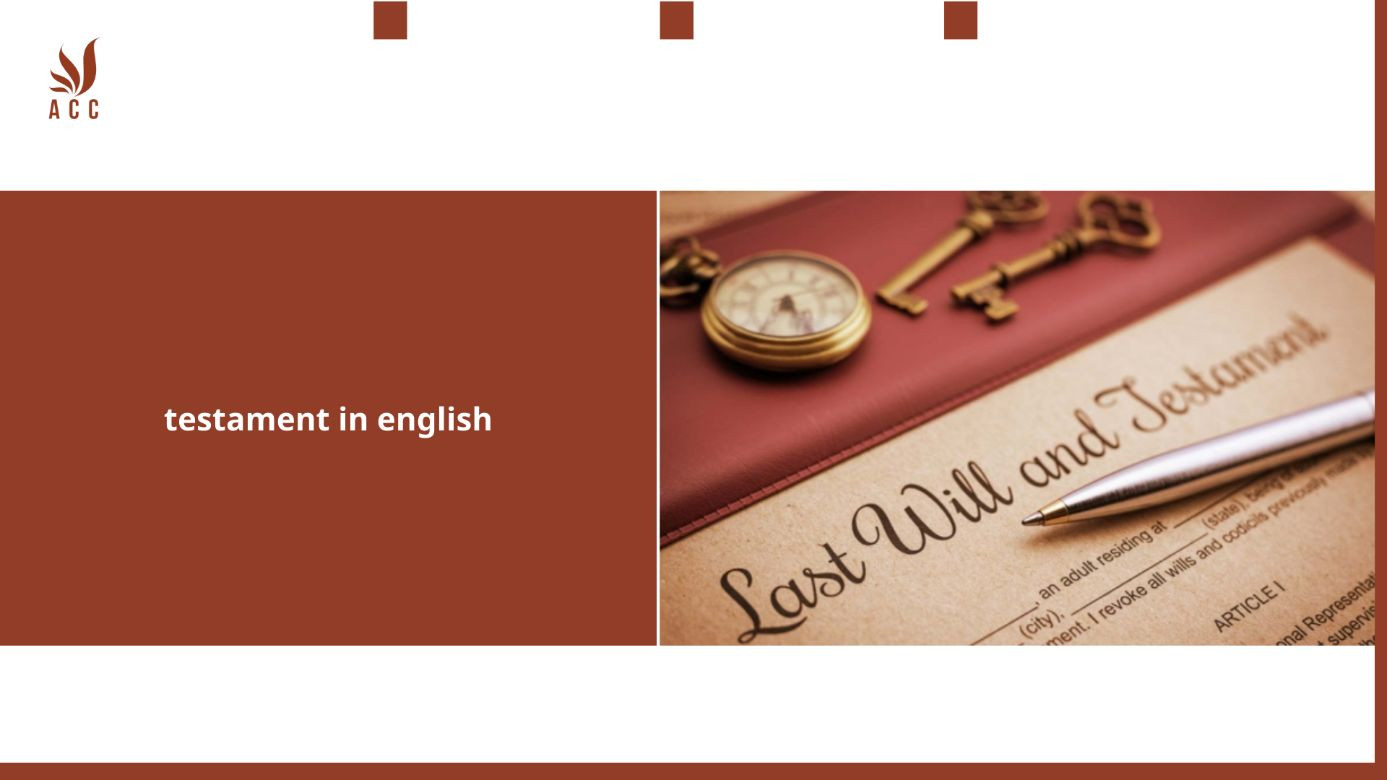I. Testament in english
A "testament" is a legal term that typically refers to a document that outlines a person's final wishes regarding the distribution of their assets and property after their death. In English, this document is commonly known as a "last will and testament." Here's a template for a last will and testament:

Last Will and Testament
I, [Your Full Name], of [Your Address], City of [City], State of [State], being of sound mind and legal capacity, make this last will and testament to express my final wishes regarding the distribution of my assets and property upon my death. I revoke all previous wills and codicils.
1. Beneficiaries and Bequests
I hereby bequeath my assets and property as follows:
For Example:
a. I bequeath my real estate property located at [Property Address] to [Beneficiary's Full Name].
b. I bequeath my financial assets, including [Account Numbers], to [Beneficiary's Full Name] in equal shares.
c. I bequeath my personal belongings, including [Description of Items], to [Beneficiary's Full Name].
2. Guardianship (if applicable)
[Include this section if you have minor children and wish to designate a guardian.]
I appoint [Guardian's Full Name] as the legal guardian of my minor child(ren), [Child 1's Full Name], [Child 2's Full Name], etc., in the event of my death.
3. Executor
I appoint [Executor's Full Name] as the executor of my estate. It is my wish that they carry out the distribution of my assets and property in accordance with the provisions of this will.
4. Debts and Expenses
I direct my executor to pay all my just debts, funeral expenses, and the expenses of administering my estate, including any costs associated with transferring my assets to the designated beneficiaries, as soon as reasonably possible after my passing.
5. No Contest Clause
I include a no contest clause in this will, and any beneficiary who contests this will or any of its provisions shall forfeit their right to any inheritance under this will.
6. Governing Law
This will shall be governed and construed in accordance with the laws of [State/Country].
In witness whereof, I have executed this last will and testament on [Date].
[Your Signature]
[Your Printed Name]
Witnesses:
[Witness 1's Full Name]
[Witness 1's Address]
[City, State, Zip Code]
[Witness 2's Full Name]
[Witness 2's Address]
[City, State, Zip Code]
Signed, declared, and acknowledged by [Your Full Name] in our presence as their last will and testament, and at their request, we have signed our names as witnesses in their presence and in the presence of each other.
[Witness 1's Signature] Date
[Witness 2's Signature] Date
Please consult with an attorney to ensure that this last will and testament complies with the laws and regulations of your jurisdiction and accurately reflects your unique circumstances and wishes regarding your assets and property.
II. When using ACC Law Firm's testament, entrepreneurs will receive
When using ACC Law Firm's testament, entrepreneurs will receive professional legal advice and assistance in drafting a comprehensive and legally binding will that reflects their specific business needs and objectives. The testament will ensure the smooth transition of their business assets and help protect their interests and those of their beneficiaries. Additionally, entrepreneurs will have access to ongoing support and guidance from experienced attorneys who specialize in estate planning for entrepreneurs.
III. Q&a
Q1: What is a testament, and how does it differ from a will?
A1: A testament, often used interchangeably with the term "will," is a legal document that outlines an individual's wishes for the distribution of their assets and property upon their death. The primary difference is that "testament" is an older term, while "will" is more commonly used in modern legal terminology. Both serve the same purpose of specifying how assets should be distributed after one's death.
Q2: What key information should be included in a testament or will?
A2: A testament or will should include essential information, such as:
- Identification of the testator (the person making the will).
- Description of assets and property to be distributed.
- Identification of beneficiaries and their relationship to the testator.
- Appointment of an executor to carry out the wishes.
- Guardianship provisions for minor children (if applicable).
- Special bequests or conditions (if any).
- Signature of the testator and witnesses, as required by local laws.
Q3: Can a testament be contested in court, and under what circumstances?
A3: Yes, a testament can be contested in court under various circumstances. Common reasons for contesting a will include:
- Allegations of undue influence or coercion on the testator.
- Questions about the testator's mental capacity at the time of making the will.
- Claims of fraud or forgery related to the will's creation.
- Disputes among beneficiaries or potential heirs.
- Allegations that the will does not comply with legal formalities.
Contesting a will is a legal process that typically involves presenting evidence and arguments in court. The outcome depends on the specific circumstances and evidence presented.
Q4: How often should a person review and update their testament or will?
A4: It's advisable for individuals to review and update their testament or will periodically, especially when significant life events occur. These events may include marriages, divorces, births, deaths, changes in financial circumstances, or alterations in relationships with beneficiaries or executors. Regular reviews, such as every few years, can help ensure that the testament remains current and accurately reflects the testator's wishes.
Nội dung bài viết:






Bình luận